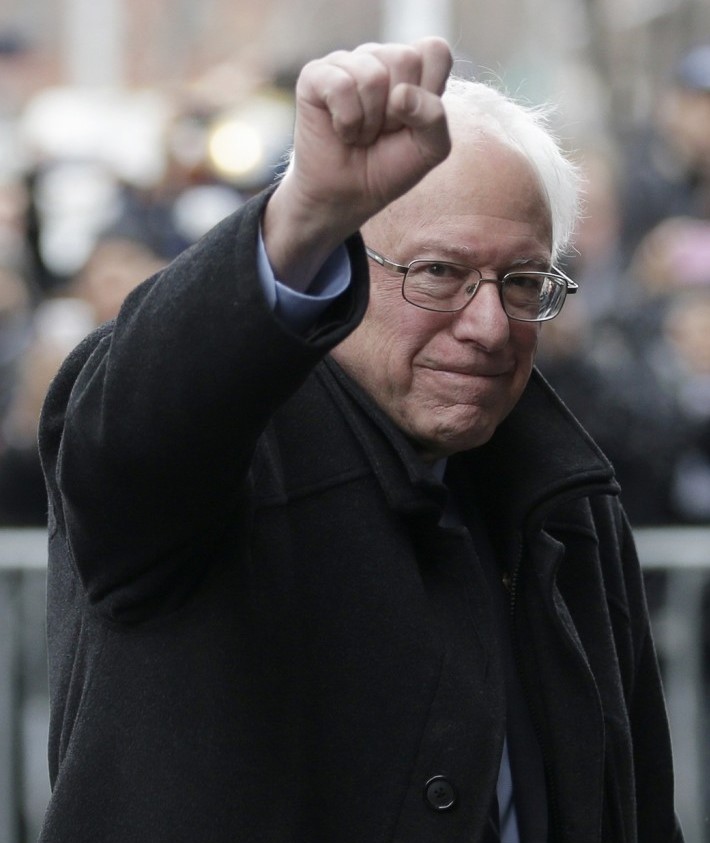- California Assembly OKs highest minimum wage in nation
- S. Korea unveils first graphic cigarette warnings
- US joins with South Korea, Japan in bid to deter North Korea
- LPGA golfer Chun In-gee finally back in action
- S. Korea won’t be top seed in final World Cup qualification round
- US men’s soccer misses 2nd straight Olympics
- US back on track in qualifying with 4-0 win over Guatemala
- High-intensity workout injuries spawn cottage industry
- CDC expands range of Zika mosquitoes into parts of Northeast
- Who knew? ‘The Walking Dead’ is helping families connect
Sanders needs big-time wins, superdelegates to catch Clinton
WASHINGTON (AP) — Bernie Sanders must win 66 percent of the remaining delegates through June to erase Hillary Clinton’s lead, requiring landslide victories in big states and winning over skeptical superdelegates.
So far, he has been unable to do either.
Clinton’s victories in four of five states Tuesday — the race in Missouri was too close to call — left her with 1,139 pledged delegates won in primaries and caucuses, according to The Associated Press’ count. Sanders has 825.
She picked up twice the number of delegates than Sanders in Florida — the biggest prize of the night, with 214 delegates. She stymied Sanders’ efforts to make up ground by also winning North Carolina, Ohio and Illinois, stopping Sanders’ momentum after his upset win last week in Michigan.
All the Democratic contests award delegates in proportion to the share of the vote, rather than winner-take-all, so even the loser gets some.
When factoring in superdelegates, which include party officials, Clinton holds a 1,606-851 lead, giving her two-thirds of the number to win, 2,383.
An additional 2,308 delegates, both pledged and superdelegates, remain to be awarded.
“Delegate math is a heartbreaker,” said Democratic strategist Joe Trippi, who managed Howard Dean’s primary campaign in 2004. “Even with a number of state wins, it doesn’t matter if he can’t make up delegates. He’ll have to start winning over superdelegates, but he’s got some convincing to do.”
Superdelegates are the Democratic establishment — party officials, governors and members of Congress who can back any candidate they wish. Together, they make up nearly one-third of the clinching total, and their support for Clinton has been strong.
Of the 493 who endorsed a candidate so far, just 26 said they would back Sanders, according to AP’s survey. There are 221 who have yet to commit to a candidate.
Superdelegates are free to change allegiances; many did so in 2008, going with Barack Obama after giving early support to Clinton. That shift came after a victories by Obama that gave him an overall lead in the pledged delegate count and convinced superdelegates that he could win the general election.
In AP’s survey last month, many superdelegates expressed concern that Sanders, who describes himself as a democratic socialist, might not be able to withstand opposition from a GOP nominee. Among the uncommitted, most said they needed to learn more about Sanders before making a decision.
“I like Bernie Sanders, but … they’re going to tar him with being a socialist,” said Indiana superdelegate Shari Mellin, who is backing Clinton. “That word has come to mean — because of the way Republicans have exploited it — terrible things in this country.”
Never before have superdelegates backed a candidate who had fewer pledged delegates than his or her opponent.
Halfway through the 2016 primary season, Sanders has won nine states to Clinton’s 16. He’s heading into a batch of caucus contests in the West that he believes will be friendly to him, and sees the Wisconsin primary as favorable terrain.
Those seven states collectively offer 298 delegates, but he trails Clinton in total pledged delegates by more than that.
Clinton still needs more than 700 delegates to clinch the nomination. Just over 1,000 delegates will be at stake from late March through the end of April, a pot that may not be big enough for her to wrap up the nomination if Sanders splits contests with her.
“Our campaign will continue to compete in every state and will work to amass as many pledged delegates as possible everywhere,” Clinton campaign manager Robby Mook wrote in a memo Wednesday.
Sanders strategist Tad Devine predicted a stronger performance ahead and said Sanders will sway superdelegates.
“We acknowledge it’s a difficult route, we acknowledge it’s a substantial lead, but we do not believe it’s set in stone,” Devine said. “The factors superdelegates will take into consideration include who’s won more pledged delegates … but also who’s gotten stronger, not weaker, over the course of primaries, and who matches up best against Donald Trump or whoever the Republican nominee is.”

















